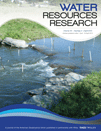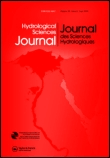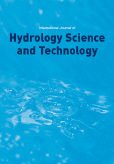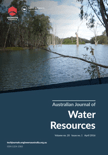
Groundwater for Sustainable Development
Scope & Guideline
Elevating knowledge in groundwater resource management.
Introduction
Aims and Scopes
- Groundwater Quality Assessment:
Research in this area focuses on evaluating the chemical, biological, and physical characteristics of groundwater, using various indices and methodologies to determine its suitability for drinking and irrigation. - Groundwater Management and Sustainability:
This scope encompasses studies that develop strategies for sustainable groundwater use, including resource allocation, conservation techniques, and the impact of human activities on groundwater systems. - Pollution and Contamination Studies:
Investigations in this area address the sources, impacts, and remediation strategies for groundwater contamination, particularly focusing on heavy metals, nitrates, and emerging pollutants. - Hydrogeological Characterization and Modeling:
Research involves the assessment and modeling of aquifer systems, utilizing geophysical, geochemical, and hydrological methods to understand groundwater flow dynamics and resource availability. - Climate Change Impacts:
This area examines the effects of climate variability on groundwater resources, including recharge rates and water quality, highlighting the need for adaptive management practices. - Technological Innovations:
Studies focus on the application of advanced technologies, such as machine learning and remote sensing, to improve groundwater monitoring, assessment, and management. - Community and Policy Engagement:
Research in this area emphasizes the role of community involvement and policy frameworks in groundwater management, advocating for participatory approaches and effective governance.
Trending and Emerging
- Machine Learning and Data Science Applications:
An increasing number of studies are leveraging machine learning and data analytics to enhance groundwater quality predictions, resource management, and modeling, reflecting a broader trend towards data-driven decision-making. - Integrated Water Resource Management (IWRM):
There is a growing focus on IWRM approaches that consider the interconnectedness of surface and groundwater, promoting holistic management strategies that encompass various water uses and stakeholders. - Emerging Contaminants and Health Risks:
Research is increasingly addressing the presence and impact of emerging contaminants, such as pharmaceuticals and personal care products, in groundwater, highlighting the associated health risks and remediation technologies. - Climate Resilience and Adaptation Strategies:
Studies are trending towards developing and assessing strategies for groundwater systems to adapt to climate change, emphasizing the need for resilience in water resource management. - Community Involvement and Governance:
Emerging themes focus on the role of local communities in groundwater management, advocating for participatory governance models that empower stakeholders and enhance sustainable practices. - Remote Sensing and Geospatial Technologies:
The application of remote sensing and geospatial analysis in groundwater studies is on the rise, providing new insights into resource mapping, monitoring, and management.
Declining or Waning
- Traditional Water Resource Management Practices:
There is a noticeable decline in studies advocating for conventional water management strategies, as research increasingly emphasizes innovative and sustainable approaches to groundwater management. - Localized Case Studies:
Research focusing solely on localized, case-specific studies has decreased, with a shift towards broader, comparative studies that evaluate groundwater issues across different regions and contexts. - Basic Hydrogeological Surveys:
The frequency of basic hydrogeological surveys has waned, as the field moves towards more complex modeling and integrated assessments that utilize advanced technologies and interdisciplinary approaches. - Historical Data Analysis without Modern Context:
Research that solely relies on historical data without integrating contemporary environmental and anthropogenic factors has seen a decline, as the focus shifts towards real-time data and dynamic modeling. - Single Contaminant Studies:
There is a reduced emphasis on studies examining single contaminants in isolation, as researchers increasingly adopt a multi-contaminant perspective in assessing groundwater quality and health risks.
Similar Journals

Acque Sotterranee-Italian Journal of Groundwater
Pioneering studies in environmental sustainability.Acque Sotterranee - Italian Journal of Groundwater is a premier scholarly publication dedicated to the study of groundwater dynamics and its critical role in environmental sustainability. Published by PAGEPRESS PUBL, this reputable journal has been an Open Access platform since 2012, enabling widespread dissemination of groundbreaking research and fostering collaboration within the international scientific community. With an evolving focus that spans from environmental chemistry to geophysics, it is categorized in esteemed quartiles across multiple disciplines—highlighting its relevance in Environmental Engineering, Geotechnical Engineering, and Water Science. Furthermore, showcasing a commendable standing in Scopus rankings, it provides a vital resource for researchers and professionals committed to advancing knowledge in groundwater management and conservation. Operating from Pavia, Italy, the journal's objectives align with promoting quality research and innovative solutions essential for tackling pressing water-related challenges, making it an indispensable asset for scholars and practitioners alike.

Grundwasser
Unveiling the complexities of groundwater systems.Grundwasser is a prominent academic journal hosted by SPRINGER HEIDELBERG, dedicated to advancing knowledge in the field of water science and technology. With its ISSN 1430-483X and E-ISSN 1432-1165, the journal serves as a crucial platform for disseminating research findings, methodologies, and case studies related to groundwater management, hydrology, and environmental sustainability. Since its inception in 1997 and continuing through 2024, Grundwasser has established itself within the Q3 quartile of the Water Science and Technology category, as recognized by Scopus, ranking #164 out of 261 in Environmental Science. The journal emphasizes rigorous peer-reviewed content, aimed at fostering a deeper understanding of groundwater systems, their ecological implications, and the challenges posed by climate change. Researchers, professionals, and students are encouraged to delve into the latest studies and contribute to this vital area of environmental science, contributing to both academic knowledge and practical applications in groundwater sustainability.

Water Resources and Irrigation Management-WRIM
Advancing Sustainable Solutions for Water ManagementWater Resources and Irrigation Management (WRIM), published by Universidade Federal do Recôncavo da Bahia, is a vital academic journal focused on the essential fields of water resources and irrigation practices. With an ISSN of 2316-6886, this journal aims to disseminate high-quality research that addresses the challenges of sustainable water management in agricultural settings, particularly in the unique contexts of Brazil and similar ecosystems. The journal emphasizes rigorous empirical studies, innovative approaches, and policy implications, positioning itself as a key resource for researchers, practitioners, and students engaged in water resource management and agricultural sustainability. Although currently not available as Open Access, WRIM is dedicated to advancing knowledge in this critical area, encouraging collaboration and discourse among professionals passionate about optimizing irrigation systems and environmental stewardship.

WATER RESOURCES RESEARCH
Elevating Environmental Science through Water ResearchWATER RESOURCES RESEARCH, published by the American Geophysical Union, stands as a premier journal in the field of environmental science, specifically within the domain of water science and technology. With an impressive impact factor and a categorical ranking of Q1 for 2023, it ranks within the top 10% of relevant journals, evidencing its critical role in advancing the knowledge and application of water resources research. Since its inception in 1965, the journal has been dedicated to rigorous research that addresses pressing global challenges related to water resource management, hydrology, and environmental sustainability. The journal's comprehensive publication scope aims to present innovative findings and methodologies that can shape effective policies and practices. Although it does not offer open access, the robust research it publishes continues to influence academics and practitioners alike, ensuring its position as an essential resource for anyone engaged in the pursuit of water-related knowledge and solutions.

Hydrological Sciences Journal
Exploring the depths of hydrological innovation.Hydrological Sciences Journal, published by Taylor & Francis Ltd, is a leading peer-reviewed publication dedicated to advancing the field of hydrology, spanning topics from water management to climate impacts on hydrological systems. With an impressive impact factor and a noted Q1 category ranking in Water Science and Technology, the journal occupies a pivotal role in the academic landscape, facilitating high-quality research dissemination since its inception in 1982. The journal is indexed in Scopus, holding a commendable rank of #48 out of 261 in the Environmental Science category, placing it in the 81st percentile among its peers. Although it does not offer Open Access options, the journal ensures extensive reach and readership through institutional subscriptions. As it converges toward its milestone of 2024, the Hydrological Sciences Journal remains an indispensable resource for researchers, professionals, and students eager to explore the latest advancements and methodologies in hydrological research.

Journal of Hydrology-Regional Studies
Shaping the future of water science through collaboration.Journal of Hydrology-Regional Studies, published by ELSEVIER in the Netherlands, stands as a leading open-access platform since 2014 for disseminating high-quality research in the fields of hydrology and water management. With an impressive impact factor and recognition as a Q1 journal in both Earth and Planetary Sciences and Water Science and Technology categories, it emphasizes regional studies that advance understanding of hydrological processes and their implications for sustainable management practices. The journal has established a significant global reach, evident from its Scopus rankings, which place it in the top percentiles within its disciplines, fostering a dynamic exchange of ideas among researchers, professionals, and students alike. By mobilizing critical insights and innovative solutions in hydrology, this journal aims to contribute to solving the pressing water-related challenges faced by our society.

Hydrology Research
Transforming water science through open access innovation.Hydrology Research, a leading academic journal published by IWA Publishing, is dedicated to advancing the field of water science and technology. With an impressive impact factor and a Q2 ranking in its category, the journal plays a pivotal role in disseminating innovative research and practices in hydrology. Established in 1973 and transitioning to an Open Access model in 2020, it provides unrestricted access to high-quality articles that cover a broad spectrum of topics, including hydrological processes, water management, and environmental impact assessments. Situated in Denmark, Hydrology Research continues to thrive as an essential platform for researchers, professionals, and students alike, encouraging the exchange of ideas that contribute to sustainable water solutions worldwide. With a comprehensive coverage of research converging from 1973 to 2024, it stands as a testament to ongoing progress in the water science community.

Natural Resources Research
Elevating the dialogue on sustainable resource use and management.Natural Resources Research is a premier academic journal that plays a vital role in advancing the field of environmental science, particularly in the management and sustainable use of natural resources. Published by Springer, the journal boasts an impressive impact factor and is currently ranked in the Q1 quartile for Environmental Science, reflecting its significant contribution to knowledge and research in this domain. With a notable ranking of #21/233 in the general environmental science category and a remarkable 91st percentile, it serves as a reputable platform for researchers, professionals, and students seeking to publish and access high-quality research. The journal's archival span from 1996 to 2024 underscores its longstanding commitment to addressing pressing environmental issues, facilitating robust discussions on natural resource policy, conservation strategies, and innovative technological advancements. While the journal is not open access, it ensures wide dissemination of its content, bolstering the critical dialogue necessary for enhanced understanding and action in the field. Natural Resources Research continues to be an essential resource for those dedicated to sustainability and the responsible stewardship of our planet's resources.

International Journal of Hydrology Science and Technology
Shaping the Future of Hydrology with Cutting-edge ResearchThe International Journal of Hydrology Science and Technology, published by InderScience Enterprises Ltd, is a distinguished platform dedicated to advancing knowledge in the field of hydrology, environmental engineering, and water science. With an ISSN of 2042-7808 and an E-ISSN of 2042-7816, this journal, established in 2011 and continuing through 2024, serves as an essential resource for researchers, professionals, and students alike. Despite being categorized in the Q3 quartile across multiple disciplines including Earth and Planetary Sciences, Environmental Engineering, Waste Management and Disposal, and Water Science and Technology, the journal maintains a reputation for contributing significant findings that impact both theory and practical applications in addressing hydrological challenges. Currently unavailable through Open Access options, the journal remains committed to disseminating valuable research that informs sustainable practices in water resource management. The editorial team encourages submissions that explore innovative strategies and methodologies while fostering interdisciplinary discussions, making this journal a pivotal player in shaping the future of hydrological science.

Australasian Journal of Water Resources
Empowering Researchers to Tackle Water ChallengesThe Australasian Journal of Water Resources, published by Taylor & Francis AS, stands as a pivotal resource in the field of water science and technology. With an ISSN of 1324-1583 and E-ISSN 2204-227X, this esteemed journal facilitates the dissemination of high-quality research articles that address critical issues facing water resources management across Australasia and beyond. Ranking in the Q2 category for Water Science and Technology as per the 2023 metrics, it boasts an impressive Scopus ranking of 75/261 in Environmental Science, placing it in the 71st percentile for its field. Spanning from 2008 to 2024, the journal emphasizes the importance of sustainable water practices, innovative technologies, and environmental policy, making it an invaluable asset for researchers, professionals, and students seeking to advance their knowledge and contribute to the discourse on water management challenges. The journal's rigorous peer-review process and commitment to open academic dialogue ensure that emerging trends and pioneering ideas receive the attention they deserve.